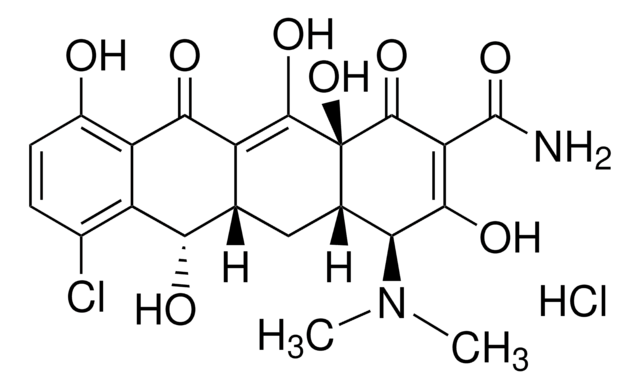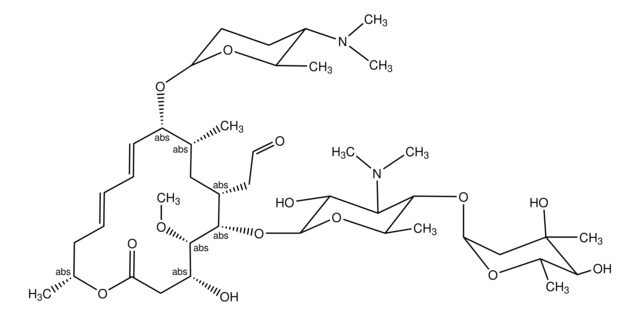26430
Chlortetracycline hydrochloride
suitable for fluorescence, BioReagent, from Streptomyces aureofaciens, ≥85.0% (HPLC)
Synonym(s):
7-Chlorotetracycline hydrochloride
About This Item
Recommended Products
biological source
Streptomyces aureofaciens
Quality Level
product line
BioReagent
Assay
≥85.0% (HPLC)
form
powder or crystals
color
faintly yellow to yellow
mp
210-215 °C (dec.) (lit.)
solubility
H2O: 50 mg/mL
suitability
suitable for fluorescence
antibiotic activity spectrum
Gram-negative bacteria
Gram-positive bacteria
Mode of action
protein synthesis | interferes
storage temp.
−20°C
SMILES string
Cl.CN(C)[C@H]1[C@@H]2CC3C(=C(O)[C@]2(O)C(=O)C(C(N)=O)=C1O)C(=O)c4c(O)ccc(Cl)c4[C@@]3(C)O
InChI
1S/C22H23ClN2O8.ClH/c1-21(32)7-6-8-15(25(2)3)17(28)13(20(24)31)19(30)22(8,33)18(29)11(7)16(27)12-10(26)5-4-9(23)14(12)21;/h4-5,7-8,15,26,28-29,32-33H,6H2,1-3H3,(H2,24,31);1H/t7?,8-,15-,21-,22-;/m0./s1
InChI key
CBHYYLPALVVVEY-LYNLVHCPSA-N
Looking for similar products? Visit Product Comparison Guide
General description
Application
Biochem/physiol Actions
Mode of Action: Inhibits protein synthesis (elongation) by preventing binding of aminoacyl-tRNA to the 30S subunit.
Antimicrobial spectrum: Gram-positive. Less active against Gram-negative bacteria than tetracycline.
Mode of Resistance: Loss of cell wall permeability.
Packaging
Quality
Other Notes
Signal Word
Warning
Hazard Statements
Precautionary Statements
Hazard Classifications
Eye Irrit. 2 - Repr. 2 - Skin Irrit. 2 - Skin Sens. 1 - STOT SE 3
Target Organs
Respiratory system
Storage Class Code
11 - Combustible Solids
WGK
WGK 2
Flash Point(F)
Not applicable
Flash Point(C)
Not applicable
Personal Protective Equipment
Certificates of Analysis (COA)
Search for Certificates of Analysis (COA) by entering the products Lot/Batch Number. Lot and Batch Numbers can be found on a product’s label following the words ‘Lot’ or ‘Batch’.
Already Own This Product?
Find documentation for the products that you have recently purchased in the Document Library.
Customers Also Viewed
Our team of scientists has experience in all areas of research including Life Science, Material Science, Chemical Synthesis, Chromatography, Analytical and many others.
Contact Technical Service












